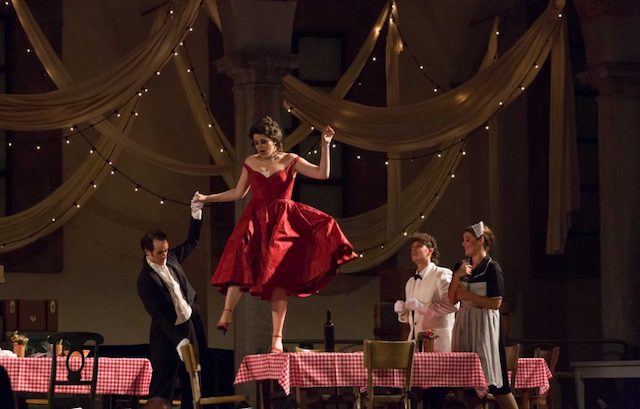A Night at the Opera
by Laura Schulkind

Don Pasquale, Palermo, July 2018 / Photograph from BlogSicilia.it
The Orchestra Tunes to Oboe and Gull
The chairs are set out in rows in the courtyard.
It is dusk, and the stone of the ancient cloister
still holds the heat of the long summer day.
A lone gull flies overhead toward the sea.
In winter, we might describe his call as mournful.
But it is summer, and it is Don Pasquale.
Longing is sweet and brief, tempers fleeting,
lovers sure to be united in the end.
No, as he soars above the makeshift stage,
the musicians tuning to his long, high A,
the gull’s cry sounds full of promise.
He is calling to his mate,
I am coming. I am coming.
Overture
The brassy overture begins,
horns heralding a party,
and suddenly the violet sky above the stage lights
is full of bats who have accepted the invitation—
careening eave to eave, like drunken party crashers,
giddy from the momentary dizzying they must feel
as the tympani echoes against the stone walls.
Act 1
The singing brings the swifts,
their lean sickle-winged silhouettes swooping
in the purpling light.
Old Pasquale hopes for young love, and
Dr. Malatesta laughs at his folly,
and the swifts laugh along with him,
circling higher and higher—
What a scream!
What a scream!
Act 2
Poor Ernesto trudges onto stage
with his meager luggage.
A lone trumpet, gull-like,
accompanies his plaintive song.
But come the swifts again,
bringing comic relief, as if on cue.
Travel to distant lands, you say? Oh boo hoo!
We travel to Africa and back and never lose our loves.
So stop your whining and go get your girl.
Act 3
Then they are all here—
Ernesto and Norina flush with love’s promise,
Dr. Malatesta pleased with himself,
Don Pasquale good-natured loser in the end.
And the chorus of partygoers is here too,
in heels and petticoats,
fedoras and fat ties,
and beak and feather and veined wing.
For the stalwart swifts are still here,
joining in a last night song,
the gull has returned for the finale, and
one grumpy bat, kept up past his bedtime,
swoops across the stage and crawls up under the cornice.
Perhaps if they had done Die Fledermaus,
he would have felt less put out.
The Curtain Call
But by curtain call the winged chorus have all gone to roost.
Music over, they have lost interest, perhaps.
But this seems quite wrong.
I want them to take their bows—
for decorating the night sky with their flight,
for adding their song to ours.
Bravo, gull and grumpy bat.
Bravo, mirthful swifts.
Well sung! Well danced! Well flown!
Laura Schulkind received her JD from New York University, where she focused on public service law, and she has been practicing for thirty years. Growing from her deep belief in the importance of free public education for all, she specializes in representing public school and community college districts throughout California. She is a past president of her statewide professional organization, the California Council of School Attorneys, and is a sought-after speaker throughout the state on issues of diversity and equity in education.
“I write poetry and fiction,” Schulkind says, “because, lawyer that I am, I believe in the power of a well-told story. However, in law I am entrusted with others’ stories. Through poetry and fiction I tell my own.” Her chapbook, Lost in Tall Grass (Finishing Line Press), was released in May 2014, and her new chapbook, The Long Arc of Grief, also with FLP, will be coming out in 2019. Her work has also appeared in many journals, most recently The Broad River Review, Gold Man Review, Origins, Reed Magazine, Reunion Journal (forthcoming), Valparaiso Review, and Voices de la Luna. Links to her published work (along with musings on why “lawyer-poet” isn’t an oxymoron) can also be found on her website, lauraschulkind.com.